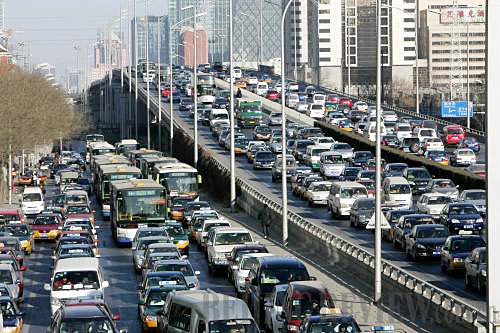|
 |
|
AUTO PLAGUE: Traffic slows to a halt on the East Third Ring Road in Beijing. During rush hour in the Chinese capital, major traffic congestion can be seen on all of the city's major roads (ZHAO BING) |
Analysts with the China Association of Automobile Manufacturers said Beijing's decision will inevitably exert negative influence on the sound development of the auto industry. And since Beijing's practice is likely to be adopted by other cities with traffic problems, the negative influence will ultimately impact national economic growth and cause a slump throughout the auto industrial chain, from the rubber and oil to iron, steel and glass industries.
A report published by the China Passenger Car Association in December 2010 pointed out several problems in the Chinese auto market. A large number of autos—reaching 400,000 to 500,000—were stocked in dealerships in 2010 and will likely go unsold in 2011. The slowdown in 2011 will also result in zero growth or limited growth for commercial vehicles. In addition, the surge of imported car sales will devour about 200,000 domestic auto brand sales.
Opposing the pessimism, Zhang Xiaoyu, Vice President of the China Machinery Industry Federation, argued the market slowdown might be good news for the Chinese auto industry.
Zhang said, judging by long-term economic development, Chinese auto consumption will continue to grow in the next few years since second-, third- and fourth-tier cities, as well as rural areas, still have huge market potential. China's urbanization process will also be accompanied by rising auto consumption. At present, nearly all multinational automakers consider China to be the most important market in their development strategy.
However, the majority of the 100-plus Chinese automakers are lingering around the low-end market and few are able to enter the high-end brand market. Multinational automakers make a fortune on designs, new materials and new technology, but their Chinese peers are merely manufacturing cars.
Zhang said sales volume should not be the most important concern for the Chinese auto industry. Priority should be placed on upgrading the industry and moving it up the value chain without policy stimuli. Facing the suspension of favorable policies, automakers should optimize their production and design.
"The next decade is the most critical period for the Chinese auto industry to grow from big to strong," said Zhang.
The slowdown, Zhang said, is a blessing in disguise for the auto industry. The high growth rate in the past two years cannot cover up the problems existing in the industry, and the surge in car consumption has led to traffic jams, air pollution and national energy security problems that need to be addressed immediately.
Take oil supply for example. In 2009, about 53 percent of the domestic oil consumption was imported, and the rate is expected to reach 55 percent in 2010, turning oil security into a big problem. The reduction in auto sales will in effect ease the country's reliance on oil imports.
Strength training
"Major changes will take place among Beijing's auto dealerships, and it's likely that 50 percent of the incompetent dealers will be forced out of the market," said Guo Yong, Manager of the Business Information Center of the Beiya Automobile Market in Beijing.
Guo said the first quarter of 2011 will be a bleak one. With the abrupt plunge in sales, auto dealerships' operational costs will grow heavier with possible cuts in the capital chain, resulting in the closing of a number of dealerships.
Luo Ruifeng, a Changan Automobile dealer, said due to the license plate issuance restriction, half of the small and medium-level brands will be retreating from the Beijing market. Newly opened 4S dealerships will find it hard to survive.
Confronted with huge pressures, Luo said his store will upgrade its services to attract more customers. In the meantime, they will focus on the neighboring Tianjin market and key account market to help the sales volume in 2011 reach the 2010 level. But whether the goal can be reached or not remains to be seen.
Employees in some other 4S dealerships said if they could not turn a profit in the next one or two months, they might quit or find similar jobs in other cities.
At present, the rise in labor and raw material costs, coupled with the slowdown in sales, means a plunge in profit since dealers cannot absorb increases by soaring car prices. Therefore, this year could be the hardest for the Chinese auto industry. Jia said the most important problem for domestic automakers in 2011 is not the growth speed, but profit. The most dangerous strategy is to start a price war. Ultimately, lower costs in a bleak market will be a challenge all automakers must face in the coming year, Jia said. | 